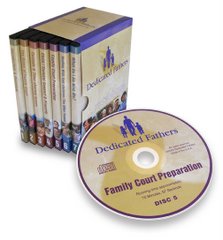
QUOTES AND SAYINGS FOR A MORE POSITIVE OUTLOOK
The following is a list of quotes and sayings that can and will positively effect your future. By changing your thinking you can change your life.
www.dedicatedfathers.org
• Not all who wander are lost.
• Success is getting up one more time than you fall down.
• Don’t trouble trouble, until trouble troubles you.
• “The best way to destroy an enemy is to make him you friend”--Abraham Lincoln
• If you plant a tree, don’t keep pulling it up by the roots to see how it’s growing.
• Adversity tempers the spirit.
• Doing the right thing requires courage.
• Your Choice: Victim or Victor.
• Surround yourself with the precious few who believe in you.
• Winning like losing, is a choice
• Belief in yourself far outweighs the doubts of others.
• Recipe for life–someone to love, something to do and something to look forward to.
• Live in harmony with your highest values and your innermost convictions. Never compromise.
• You must become the person you want to be on the inside before you see the appearance of this person on the outside.
• Develop a benevolent world view; look for the good in the people and circumstances around you.
• If you conduct yourself as though you expect to be successful and happy, you will seldom be disappointed.
• “Do what you can, with what you have, right where you are”--Theodore Roosevelt.
• Circumstances do not make the man; they merely reveal him to himself.
• It is when you finally learn that your fears are all in your mind that your life begins.
• Your outer world is a reflection of your inner world.
• Failure is merely another opportunity to more intelligently begin again.
• You are surrounded right now by unlimited opportunities disguised as insurmountable problems.
• “When a man begins to realize the truth about himself, it lessens his desire to reform his neighbors.”--Mark Twain
• Faith is to believe what we do not see, and the reward of the faith is to see what we believe.
Visualize success. Picture yourself succeeding. You will succeed.
Posted By: Dedicated Fathers
For more information and guidance on divorce and child custody please visit www.dedicatedfathers.org & www.unitedfathers.org
Thank you
Monday, March 19, 2007
QUOTES AND SAYINGS FOR A MORE POSITIVE OUTLOOK
Posted by
Dedicated Father
at
11:59 AM
48
comments
![]()
Labels: attorneys, child custody, children, counseling, divorce, divorce coach, fathers rights, legal, mediation, personal growth
Collaborative Divorce vs. Adversarial Divorce: A new outlook
COLLABORATIVE DIVORCE
Collaborative Divorce vs Adversarial Divorce
A Positive Outlook
By:Marvin Chapman
www.dedicatedfathers.org
1. Collaborative divorce is a process involving family law attorneys, mental health professionals and financial specialists, all working together cooperatively to bring about a solution that is fair, just and equitable for all family members. Each of the professionals on the team assist both husband and wife to make informed decisions in an atmosphere of respect and fairness. Without the judge to make the orders, the divorcing couple is empowered to make their own informed decisions with the advice and guidance of their professional team.
2. The husband and wife control the pace of their divorce and the decisions being made.
3. The husband and wife receive advice and guidance from a team of professionals, who will not only help them through the current divorce process, but enrich their future lives as well.
4. The children have a voice without fear of what they say being used against one of their parents in court.
5. Compared to the cost of the traditional adversarial litigation method, the cost of the collaborative divorce process can be much less expensive.
6. Dissolving a marriage collaboratively encourages respect and a continuing civil relationship between husband and wife, which is paramount when children are involved.
7. Some of the key benefits of the collaborative divorce process are the following:
A. Mutually created resolutions;
B. Mutually satisfying resolutions;
C. Durable agreements;
D. New tools for effective problem-solving in the future, such as co-parenting issues;
E. Provides other professional resources to smooth transitions; and
F. Provides a safe environment for difficult conversations.
8. In the collaborative divorce model, the parents are able to maximize their financial resources because of the following:
A. Focus and time are spent on resolving problems and creating solutions, not creating more problems through numerous court appearances;
B. The expertise of each team member is brought to bear on creating family solutions;
C. Emotional issues which can inhibit the divorce process are addressed;
D. Working collaboratively and using one neutral financial professional saves time, provides focus and frames financial issues for the parties’ team to solve problems;
E. The process allows all parties to talk with one another to prevent costly, time consuming misunderstandings and additional litigation;
F. The attorneys act as guides through the process, educating their clients regarding the law, instead of taking an advocacy position and then fighting it out in court; and
G. The attorneys and coaches assist the clients in looking to future long-term goals for themselves and their children, in place of setting the client up for more hearings in the future.
The collaborative process generally gives both parents the following:
A. Peace of mind, reduced anxiety;
B. Security and privacy;
C. Less conflicts in the future;
D. More control of the outcome; and
E. Knowing you did the right thing and the best you could do for your children
BY:Marvin Chapman
Marvin Chapman, the autor of this article, has a great website devoted to divorce help and fathers rights. Why not take a look?www.dedicatedfathers.org
www.unitedfathers.org
Join the Dedicated Fathers Yahoo Discusssion Group!
Posted by
Dedicated Father
at
11:49 AM
5
comments
![]()
Labels: attorneys, child custody, children, collaborative divorce, court case, divorce, divorce coach, family court, fathers rights, law
Tuesday, March 13, 2007
Collaborative Divorce - options

COLLABORATIVE DIVORCE
A Non-Adversarial Option
www.dedicatedfathers.org
www.unitedfathers.org
A new non-adversarial divorce process is sweeping the country. This new paradigm is known as collaborative divorce. Collaborative divorce is a process involving family law attorneys, mental health professionals and financial specialists, all working together cooperatively to bring about a solution that is fair, just and equitable for all family members.
Collaborative divorce is an out-of-court process that assists husbands and wives to dissolve their marriage in a compassionate, practical and informed way, while proceeding at their own pace - not based on the court’s schedule.
Collaborative divorce is a process that supports the entire family and provides for a smooth transition for all family members.
The collaborative divorce method puts together a professional team for each couple who agree to use the process. Just as in the traditional adversarial process, both husband and wife choose an attorney to represent them; however, these attorneys have been specially-trained in the collaborative process. Joining the team are two or three mental health professionals, one of whom is retained by each spouse as their coach, and one who is hired as the child specialist - serving as the voice of the children. Rounding off the team (if needed) is the financial specialist, who is a certified financial planner, or in some cases a certified public accountant. The attorneys, mental health professionals and financial specialists have received specialized training in the collaborative divorce process.
In the traditional adversarial method, many parents use the process as a therapeutic tool to heal or sooth their pain, to justify their actions, or to seek vindication for the perceived “wrong” of the other parent, all of which become powerful emotional weapons to be used to “win at all costs” - and cost it does, a lot, both emotionally and financially.
In the collaborative process, instead of paying their attorneys to conduct research, discovery and trial preparation to “battle” the other spouse, the parties spend their money on resolving the issues constructively and fairly with the cooperative assistance of their attorneys and other team members. The team is not only committed to keep the parties out of court, they are also there to help the husband and wife transition their marriage into two households in a peaceful, intelligent and restorative manner. Therefore, rather than spending the parties’ resources in numerous court appearances, which have the potential to embitter spouses to exaggerate and exacerbate their differences, the collaborative approach is much less expensive and much less stressful.
The inclusion of the education and information team approach promotes positive healing for all family members, which provides the parties with the opportunity to make the most informed and creative decisions regarding their children. It allows the parties to make intelligent informed decisions regarding the division of their property and the distribution of future support, which will affect the financial future of all family members.
Collaborative divorce is a process which puts the parties directly in charge of their own affairs, a process not typically available under the traditional adversarial method. The adversarial process pits the two attorneys against each other. Then the judge, with no prior knowledge of the family or family dynamics, will make a decision which will affect the entire family for the rest of their lives.
In the collaborative model, power and control is maintained by the family, benefitting all family members by taking into account the uniqueness of each family member.
BY: Marvin Chapman & Dedicated Fathers
Marvin Chapman is a Certified Collaborative Divorce Coach
Order Dedicated Fathers Today!
www.dedicatedfathers.org
Posted by
Dedicated Father
at
6:23 PM
1 comments
![]()
Labels: attorneys, child custody, child support, collaborative divorce, divorce, divorce coach, fathers rights, kids, legal
Friday, December 29, 2006
To Hire an Attorney or not to Hire an Attorney (Part 2)
TO HIRE OR NOT TO HIRE AN ATTORNEY
Part Two of Two Parts
www.dedicatedfathers.org
For more related divorce information
It has been said that a person who represents themselves has a fool for a client. If this is true, is it also true that a person who hires an attorney has fool in charge of their life?
In other words, you’re damned if you do and damned if you don’t. Therefore, you need to know when, why and how to hire an attorney.
In California, if you appear in court and represent yourself it is called going In Pro Per, which literally means “In one’s own proper person.” Some states call representing yourself Pro Se, which literally means “For one’s own behalf, in person.” No matter what your state may call it, it means you are representing yourself in court. Many people have handled their own family court case, with just a little help in doing the required legal paperwork.
If it appears your case will be routine or normal (meaning no known or expected surprises), and if there does not appear to be a lot of areas of serious disagreement between you and the other side, and if you are comfortable speaking in front of people, then a paralegal or support group can help you save a lot of money by assisting you in representing yourself.
Question?
What kind of people represent themselves?
Answer:
Most people represent themselves because they outright cannot afford a family law attorney. Some people represent themselves because they have been represented by an attorneys in the past and they now believe they can represent their own interests as well, if not better, than their previous attorneys. And there are those who represent themselves because they feel that even if they lose, they will have won by not having to pay the high costs of a family law attorney (some people believe just the fact of not paying an attorney is a “win”).
Reality is that many cases require a family law attorney. An example of a divorce case requiring an attorney would be a case where there is a major confrontation over issues of custody and visitation and/or where there are serious differences over distribution of the community property. These kind of cases mandate an attorney and it would be prudent for you to retain the best attorney you can afford (of course there are those cases wherein you absolutely can not get the money together to hire an attorney. In those cases it is obviously better to represent yourself as best you can, rather than allow a default to be entered against you. In these situations, representing yourself will at least let you know for the rest of your life that you did all you could do).
However, whether or not you hire an attorney, it remains your responsibility to keep your case organized, to keep yourself updated on all happenings in your case, and to continually stay informed as to all facts
The following two sections are presented solely to assist you in determining whether or not you will want to attempt to represent yourself and, if you choose to involve an attorney, some guidelines to assist you in determining which attorney is best for you. You may want to check your state and local rules, regulations and procedures to discover whether the following notions are valid in your particular area.
If Hiring a family law attorney
1. One of the best ways to choose an attorney is to either get a recommendation from your local father’s rights organization or check with family, friends and co-workers. Hiring a family law attorney is just the opposite of hiring a criminal attorney. If hiring a criminal attorney, you want the best legal mind you can afford. Family law is just the opposite. Family law is almost totally subjective feelings and biases. In family law you are hiring a personality, someone you can get along with and who is passionate about your case and your goals.
2. Nothing is worse than a personality clash with the attorney you hired to protect you. This is your and your children’s future. During the initial consultation you will need to make a sound intelligent decision based heavily on whether or not you feel and believe you can work as a team member with the attorney. Remember, your attorney is in the driver’s seat and you need to feel very comfortable with them at the controls of your future. Therefore, when interviewing a family law attorney, you may want to consider some of the following Things to look for in an attorney... and What to avoid when hiring an attorney....
A. Things to look for in a family law attorney...
1) Is the attorney friendly, passionate and non-intimidating;
2) Will the attorney return your phone calls within a “reasonable” time;
3) Does the attorneys’ recommendations make common sense;
4) What does the attorney charge per hour and will the attorney bill you
monthly so you can easily see on a regular basis what the attorney is
costing you;
5) Are credit card payments accepted;
6) How strongly does the family law attorney support alternatives to traditional
litigation,such as outside mediation or collaborative divorce;
7) How much experience does the attorney have in family law;
8) Does the attorney specialize in family law. Just as you would not want a
general doctor to perform open-heart surgery on you, you do not want a
general attorney performing your family law case;
9) Make an agreement with your attorney in writing on your mutually agreeable
and attainable goals. To avoid misunderstandings always put both large and
small requests in writing and keep a copy for yourself (again, stay
organized);
10) Get in touch and stay in touch with a local support organization for
support, encouragement and to ensure your case is proceeding according to
your wishes; and
11) Ensure you will be given a copy of any and all documents filed on your
behalf or served on your attorney relevant to your case.
B. What to avoid when hiring a family law attorney...
1) No matter what, avoid a “divorce mill” type of operation where a group of
people are grinding out paperwork one after another and an attorney just
picks up the paperwork and goes to court. This is not an assembly line
operation, this is your life, your future and your future relationship with
your kids. This is serious business and you will want to treat it that way;
2) Avoid any and all attorneys who tell you their retainer is “non-refundable;”
3) Be suspicious and avoid any attorney who appears overly aggressive and any
attorney who “guarantees” you a certain order. Family law is an extremely
subjective area of law and no one can possibly guarantee anything;
4) Do not share an attorney with the other parent. If your case requires an
attorney, then get your own attorney to protect you and your children’s
legal rights;
5) Whatever it takes, avoid financial problems between you and your attorney.
If for any reason you are unable to honor your financial agreement with your
attorney, immediately request a meeting and work out a new agreement. You
need your attorney playing attorney, not banker;
6) Avoid letting your attorney talk you into giving up something which you
feel is important, just so the attorney can expedite the case. Be
realistic and reasonable, not foolish. Remember, you may have to live with
the results for a long time, a little extra time now can save you a lot of
heartache later. Read all legal papers you are asked to sign, understand
them clearly and completely before signing and always keep a copy for
yourself. If you find unclear language or something that is subject to any
kind of interpretation, ask your attorney to have it rewritten so it is
explicitly clear;
7) If your attorney states you do not need to be present at a hearing, make
sure you find out why you are not needed. If in doubt, have your attorney
put it in writing that you do not need attend and that he/she will make no
agreements without your consent. However, the general rule of thumb is that
you need to attend ALL court proceedings. This is you and your children’s
future and you need to be there, you need and must know what is going on in
your case;
8) After each meeting with your attorney (whether in person or over the phone)
write down what was said, accomplished, promised or planned. Mail a copy of
your written understanding of the meeting to your attorney to memorialize
that the meeting took place and what was accomplished. This will assist
your attorney in keeping on track and will remind the attorney of what was
promised;
9) Avoid telling the attorney how much money you have or how much you are
willing to spend on your case. The attorney’s focus should be about your
case, not how much money you have available to give him/her. If the
attorney talks too much about money - leave the office. An attorney
whose main focus is the money is only feeling you out to see
how much they can get from you up front - how much they can
get for a retainer;
10) Make copies of all important papers to give to your attorney. Avoid giving
originals to your attorney unless absolutely necessary. If absolutely
necessary, ensure you have a copy and assurances the originals will be
returned to you upon completion of your case (unless used as Exhibits
whereupon the originals may stay in the court file);
11) Avoid calling the attorney for every little thing that happens, it will get
very expensive. Attorneys charge by the hour, with every 6 minutes being
1/10th of an hour (Example: If your attorney charges $200 per hour
and you talk to them for 10 minutes; that call will cost you
$40). Many times it may be better to contact your father’s rights
organization first as they can usually answer many (if not most) of your
questions just based on their experience with other fathers over the years.
This will reduce the number of questions and the length of time with your
attorney, resulting in lower attorney fees for you;
12) Avoid keeping an attorney whom you feel is not representing your interests
or your children’s interests fairly or properly. In other words, do not be
afraid to fire your attorney; and
13) Your attorney was hired to do a job about which you know very little. You
should be able to contact your attorney and expect an understandable answer
within a reasonable period of time. Avoid keeping an attorney who will not
return your calls within a reasonable time.
www.dedicatedfathers.org
By: Marvin Chapman
Put yourself in a more powerful position.
Order Dedicated Fathers Today!
Posted by
Dedicated Father
at
11:28 AM
0
comments
![]()
Labels: attorneys, child custody, child support, collaborative divorce, counseling, court case, divorce, divorce coach, divorce mediation, family court, family law attorney, law, legal
Monday, December 11, 2006
Preparation for your divorce and/or child custody case
Preparation for your divorce and/or child custody case
Prior to Court
www.dedicatedfathers.org
Prior to your court hearing, you need to go to the courthouse and watch how other divorce and child custody cases are conducted. If possible, go to the exact courtroom in which your case will be heard and see how the judge handles their courtroom. Watch the courtroom process and become familiar with how things are done.
Even though you were in the courtroom observing the proceedings a day or two before, on the day of your hearing make sure you tell the court clerk or bailiff your name and make sure you are in the correct courtroom.
You can never be too prepared for a divorce or child custody court hearing. Therefore, before each court appearance, review, review, review and review some more. You need to know your court documents for that hearing inside and out.
On the Court Day
Dress appropriately and comfortably. A coat and tie are not necessarily required, but slacks and a dress shirt are the minimums. You want to look good, look professional, look respectful, without looking like a million dollars.
Never, ever be late for a divorce or child custody court hearing.
Unless requested otherwise by court personnel, do not take your children to court.
Watch your behavior from the moment you get out of your car until the time you drive away from the courthouse. You never know who is watching, what they are watching and who they may be talking to - stay alert.
Do not chew gum or candy while in the courtroom.
Once in the courtroom, do not leave unless your attorney gives you the OK. Not leaving the courtroom is especially important if you are representing yourself because if they call your case and you are in the restroom, they may count you as a “non-appearance” and take your case “off calendar.”
Stand up when the judge enters the courtroom and wait until he/she sits down before you do. Making eye contact with the judge during the proceedings is OK, but do not stare. The judge is the authority of the courtroom, they make the rules (and they can change the rules without every saying a word about it, so be flexible, be prepared and be confident).
Take a pad of paper with you to your divorce or child custody court hearing so you can write down any important information such as, dates and times of continuances, temporary orders, or special instructions from the judge.
Keep your focus purposeful and directed. Do not allow yourself to become disappointed or drained by the legal process. Family court procedures can be very stressful with frustrating delays, confusing rules and unfair tactics by some attorneys. Shake off the negatives, hold on to a positive thought and keep your energy level up - this is your life, this is your child’s life, and this is you and your child’s future at stake.
Listen to what is being said and mark down on a piece of paper any lies, discrepancies or omissions in the other parent’s testimony including any of the other parent’s witnesses’ testimony. If you have an attorney, do not whisper to your attorney; instead, pass along the notes you have been writing (unless otherwise instructed by your attorney).
When testifying in your divorce or child custody hearing, make the assumption the judge has not read any of your file, none of your current paperwork, and therefore knows absolutely nothing about your case.
Be confident, not cocky; Be assertive, not aggressive. Give an impression of confidence in yourself and your abilities as a parent.
Anytime the judge speaks to you, respond in a pleasant and polite manner.
Do not whisper or talk while the judge is talking. Never, ever make faces, gestures or remarks in response to what was said by the other parent, their attorney, a witness, or the judge. Have your best happy and confident poker face firmly planted.
Obviously, never lose your temper in front of the judge - no matter what happens, no matter what is said, no matter was is done. Stay calm, in control and confident even under extreme stress and duress. Do not get into arguments or make unseemly remarks to anyone in the court or in the halls or any surrounding area before, during or after the hearing or any breaks during the hearing.
When questioned by the judge or attorneys, keep your answers short and to the point. Never volunteer any information whatsoever. If you have an attorney, always look to your attorney before answering any questions - allowing your attorney time to object to the questioning if they need to.
In California, you will want to take a self-addressed-stamped-envelope (SASE) to give to the court clerk to mail you a copy of the Minute Order from your divorce or child custody hearing. This will save you a trip back to the courthouse later to pick up your Minute Order.
www.dedicatedfathers.org
By: Marvin Chapman
www.unitedfathers.org
Posted by
Dedicated Father
at
1:03 PM
246
comments
![]()
Labels: attorneys, case, child custody, child support, collaborative divorce, court case, divorce, family court, family court system, law, legal, mediation
Thursday, December 7, 2006
Family Court: Steps in preparing for your case

Steps in Preparing Your Case
www.dedicatedfathers.org
Step 1: KEEPING A JOURNAL
Immediately upon knowing you will be going into family court (or when you think you are heading into family court), one of the first and most important things you need to start doing is keeping journal of all significant events concerning you, your children, your finances and the other parent.
More often than not, each time you go to your divorce or child custody hearings you will need to provide a statement as to specifically what you want and justification for why you should get it. This written statement is called your “declaration.” The information in your declaration is taken directly from your written journal as outlined above.
In family court, some judges will not listen to what you have to say verbally. They will rely totally on what you have written in your papers and what the other parent has written in their responsive papers. Therefore, writing your declaration may be a very critical part of whether or not you get what you are asking for, which makes your journal entries extremely important to your case.
Step 2: PREPARING TO WRITE YOUR DECLARATION
Stay away from bringing up negative issues about the other parent, it usually makes you and not the other parent, look bad in the eyes of the court. However, many times in response to issues raised by the other parent, you will need to respond by bring up negative issues. Likewise, many times the only way to show a substantial change of circumstances affecting the best interest of your child is to bring up negative issues about the other parent. However, be very careful in the way you bring up those negative issues.
Only bring up negative issues IF you can show, demonstrate or prove how it directly affects your child or your relationship with your child - otherwise, leave it alone.
The cardinal rule of bringing up negative issues is that you always, always, always, label the negative issues as “CONCERNS.” Example: “I am concerned that every time I go to pick up our child, the other parent is never at home. I believe this confuses our child and allows our child to believe I have not come to see them and do not care about them, which is simply not true and not in our child’s best interests.”
Step 3: WRITING YOUR DECLARATION
Your declaration is simply your very clearly written statement of what has happened, including all dates whenever possible, which clearly provide the court with the reasons and justifications for the order you want the court to make. Every request you make needs to have a reason or justification for it. The judge knows absolutely nothing about you or your case. You need to bring the judge up to speed about your case very quickly (they don’t have much time to review each case, maybe 5 to 10 minutes at most).
Whenever possible, attach proof or evidence which supports what you are writing. If you do not have the proof or evidence, then state where such evidence is located. Some ideas as to proof or evidence may be pictures of you and your children enjoying your time together, statements from witnesses who have seen you interact with your children, time cards showing when you actually work, letters from teachers or church leaders as to your involvement with school and church. Get creative, but be able to back up your claims.
Step 4: THE COURT FILE
You will want to ensure you have an exact copy of the court file, which you can get from the County Clerk at your family courthouse. Your court file is needed so whomever is assisting you can see what has happened so far in your case.
Also, there are many times wherein something which has happened before will prevent you from bringing up the same issues again - a review of your court file will let you know this information. Additionally, there are many times wherein new or different paperwork is required based on what has happened before - again, a review of your court file will let you know this information.
Therefore, you will want to keep and maintain an up-to-date court file at all times.
Step 5: CHILD SUPPORT AND SPOUSAL SUPPORT (ALIMONY)
It is in your best interests to start getting copies of all canceled checks made for any kind of support you have paid and ensure you make copies of both the front and the back of those checks. Additionally, ensure you put on the check itself on the bottom left hand “comments” section that the check is for “child support” or “spousal support.”
Remember: IF YOU CAN’T PROVE YOU HAVE PAID IT, YOU OWE IT !
Never, ever pay any type of support in cash. Why? Because there is no way to prove the other parent received the money if you do not have a copy of the other parent’s signature and deposit notations from your canceled check.
Step 6: MAINTAIN ORGANIZED FILES OF EVERYTHING
You will eventually have numerous files about your divorce or child custody case which you will want to maintain and keep organized at all times. Some of the files you will want to keep are as follows:
A) One file for all correspondence with the other parent kept in chronological
order;
B) One file for all correspondence with your attorney and/or paralegal kept in
chronological order;
C) One file for all correspondence with the other parent’s attorney kept in
chronological order;
D) One file for all correspondence with the state agency collecting support
payments kept in chronological order; and
E) One file of all proof of all payments made for support (including both the front and the back of canceled checks).
Step 7: CONSULTATION WITH AN ATTORNEY AND/OR PARALEGAL
Armed with all of the information as outlined in Step 1 through Step 6 above, you are now ready to consult with an attorney, paralegal and or support organization about your divorce or child custody case.
One last thing:
"Not everything that is faced can be changed, but nothing can be changed until
it is faced." ---James Baldwin
By: Marvin Chapman
www.unitedfathers.org
Click here to order Dedicated Fathers today!
Posted by
Dedicated Father
at
11:34 AM
15
comments
![]()
Labels: alimony, attorneys, case, child custody, child support, collaborative divorce, counseling, court case, declaration, divorce, family court, fathers rights, journal, judgement, law, legal, paralegal
Tuesday, December 5, 2006
Mediation & Collaborative approach as compared to the Adversarial Divorce approach
Mediation and Collaborative Approaches as Compared to the Adversarial Approach
www.dedicatedfathers.org
In the adversarial approach, the definition of the issues is primarily determined by the attorneys. In mediation and collaborative approaches, the issues are defined by the parents. In the adversarial approach, the legal framework for the action is John vs Jane, the emphasis is on the individual. In the mediation and collaborative approaches, the legal framework for the action is John and Jane, the emphasis is on the couple and their reorganizing and restructuring family.
In the adversarial approach, the parents relationship is focused on past issues, blaming, shaming, mistrust and revenge. In mediation and collaborative approaches, the parents relationship is focused on restructuring family issues, reorganizing styles of communication, and cooperation. The parents relationship creates conflicts with their children, loyalties are divided and rewards are received for alienating the children against the other parent - creating adjustment problems for the children. In the mediation and collaborative approaches, the parents relationship focuses on preserving both parents’ relationships with their children.
In the adversarial approach, the court decides the parenting plan (regardless of the fact the judge has no idea what is best for this family). In the mediation and collaborative approaches, the parents decide the best parenting plan for them and their restructuring family. In the adversarial approach, the expense to the parents can be and typically is enormous. In the mediation and collaborative approaches, the expense is less, and many time times much less - thereby allowing the restructuring family to keep control over more of their assets.
In the adversarial approach, the time to conclusion can be extensive (after all, more time means more money for the attorneys). In the mediation and collaborative approaches, the time to conclusion is almost totally controlled by the parents. There is usually no confidentiality and the issues are open for public exposure. In the mediation and collaborative approaches, there is total confidentiality and the issues are not open for public exposure.
In the adversarial approach, the goal and desired outcome is to win at all costs, giving in as little as possible to gain as much as possible from the judge. In the mediation and collaborative approaches, the goal and desired outcome is to come to a fair, reasonable, equitable and mutually acceptable agreement as determined by the restructuring family.
With the adversarial approach, adherence to the terms of the court order is far from certain and typically will create the atmosphere of even more mistrust, which results in even more court hearings in the future. In the mediation and collaborative approaches, adherence to the terms of the agreement are far more likely since the terms of the agreement were negotiated and agreed upon by the parents themselves, therefore lessening the chances of returning for additional court hearings in the future.
By: Marvin Chapman
www.unitedfathers.org
Visit www.dedicatedfathers.org today!
Posted by
Dedicated Father
at
3:37 PM
0
comments
![]()
Labels: adversarial family court system, attorneys, child support, collaborative divorce, divorce, law, legal, mediation, survive divorce
Monday, December 4, 2006
The Collaborative Divorce Approach
www.dedicatedfathers.org
A new non-adversarial divorce process is sweeping the country. This new paradigm is known as collaborative divorce. Collaborative divorce is a process involving family law attorneys, mental health professionals and financial specialists, all working together cooperatively to bring about a solution that is fair, just and equitable for all family members.
Collaborative divorce is an out-of-court process that assists husbands and wives to dissolve their marriage in a compassionate, practical and informed way, while proceeding at their own pace - not based on the court’s schedule.
Collaborative divorce is a process that supports the entire family and provides for a smooth transition for all family members. This method puts together a professional team for each couple who agree to use the process. Just as in the traditional adversarial process, both husband and wife choose an attorney to represent them; however, these attorneys have been specially-trained in the collaborative process.
Joining the team are two or three mental health professionals, one of whom is retained by each spouse as their coach, and one who is hired as the child specialist - serving as the voice of the children. Rounding off the team (if needed) is the financial specialist, who is a certified financial planner, or in some cases a certified public accountant. The attorneys, mental health professionals and financial specialists have received specialized training in the collaborative divorce process.
In the traditional adversarial divorce method, many parents use the process as a therapeutic tool to heal or sooth their pain, to justify their actions, or to seek vindication for the perceived “wrong” of the other parent, all of which become powerful emotional weapons to be used to “win at all costs” - and cost it does, a lot, both emotionally and financially.
In the collaborative process, instead of paying their attorneys to conduct research, discovery and trial preparation to “battle” the other spouse, the parties spend their money on resolving the issues constructively and fairly with the cooperative assistance of their attorneys and other team members. The team is not only committed to keep the parties out of court, they are also there to help the husband and wife transition their marriage into two households in a peaceful, intelligent and restorative manner.
Therefore, rather than spending the parties’ resources in numerous court appearances, which have the potential to embitter spouses to exaggerate and exacerbate their differences, the collaborative approach can be less expensive and far less stressful.
The inclusion of the education and information team approach promotes positive healing for all family members, which provides the parties with the opportunity to make the most informed and creative decisions regarding their children. It allows the parties to make intelligent informed decisions regarding the division of their property and the distribution of future support, which will affect the financial future of all family members.
Collaborative divorce is a process which puts the parties directly in charge of their own affairs, a process not typically available under the traditional adversarial method. The adversarial process pits the two attorneys against each other. Then the judge, with no prior knowledge of the family or family dynamics, will make a decision which will affect the entire family for the rest of their lives.
In the collaborative model, power and control is maintained by the family, benefitting all family members by taking into account the uniqueness of each family member.
Comparing Collaborative vs. Adversarial Divorce:
Each of the professionals on the Collaborative team assist both husband and wife to make informed decisions in an atmosphere of respect and fairness. Without the judge to make the orders, the divorcing couple is empowered to make their own informed decisions with the advice and guidance of their professional team.
The husband and wife control the pace of their divorce and the decisions being made. The husband and wife receive advice and guidance from a team of professionals, who will not only help them through the current divorce process, but enrich their future lives as well.
The children have a voice without fear of what they say being used against one of their parents in court.
Compared to the cost of the traditional adversarial litigation method, the cost of the collaborative divorce process is much less expensive. Dissolving a marriage collaboratively encourages respect and a continuing civil relationship between husband and wife, which is paramount when children are involved.
Key Benefits of the Collaborative Divorce Process:
Mutually created resolutions.
Mutually satisfying resolutions.
Durable agreements.
New tools for effective problem-solving in the future, such as co-parenting issues.
Provides other professional resources to smooth transitions.
Provides a safe environment for difficult conversations.
How does the Collaborative Process Maximize Financial Resources?
Focus and time are spent on resolving problems and creating solutions, not creating more problems through numerous court appearances.
The expertise of each team member is brought to bear on creating family solutions.
Emotional issues which can inhibit the divorce process are addressed.
Working collaboratively and using one neutral financial professional saves time, provides focus and frames financial issues for the parties’ team to solve problems.
The process allows all parties to talk with one another to prevent costly, time consuming misunderstandings and additional litigation.
The attorneys act as guides through the process, educating their clients regarding the law, instead of taking an advocacy position and then fighting it out in court.
The attorneys and coaches assist the clients in looking to future long-term goals for themselves and their children, in place of setting the client up for more hearings in the future.
BY: Marvin Chapman
www.unitedfathers.org
Order Dedicated Fathers today!
Posted by
Dedicated Father
at
12:45 PM
0
comments
![]()
Labels: adversarial family court system, attorneys, child custody, child support, children, collaborative divorce, counseling, divorce, family court, law
Thursday, November 30, 2006
Divorce, custody, and Family court...A National Epidemic

www.dedicatedfathers.org
www.unitedfathers.org
I was first introduced to the family court a few years ago when a family member was in his third go-around with the Family Court system. Every time his ex-wife and her attorney thought there was another chance to extract more money out of him, he would be called back into court. He is the father of three little girls and would do just about anything keep them, and it seems that his love for his children are exactly what the family court system and attorneys were preying on. I witnessed first hand how the family court system contains some kind of intentional design and implementation to be purposely confusing and frustrating, and how it leaves you at the mercy of an attorney and a biased system that will do everything in their power to extract as much money out of you as possible. I have met plenty of honest, hard working men who have every right to enjoy custody, or joint custody of their children and have spent over $300,000 fighting for that right. There are many others I’ve met who have lost in family court due to the simple fact that they did not have enough money to fight for their god given right to be a parent and father to their children.
It’s kind of funny how in the sate of California a divorce attorney is more expensive than a criminal attorney. Maybe that is because the divorce rate in California is reported to be as high as 75%, compared to the national average of 50%. It behooves the family court system to operate like an automotive car company. They now design engines that you cannot work on by yourself, and manufacture special tools that you must have before you can replace parts on your car and you can only buy these parts at the manufacturer’s dealerships. It is the life-support system of the entire capitalist animal. The sad part about the family court system is that children and society are suffering at the hands of this mental manipulation. Children are being used as bargaining chips in the battle created by family law and divorce attorneys.
When children are involved in a divorce, attorneys will often advise their clients to charge the other party with a slue of accusation’s like sexual abuse or physical violence. Lawyers are telling their clients to lie to get an ex parte order against the other party. This is often then used at trial to gain custody, property, attorney's fees, and child support. Judges often know lawyers use this tactic, but allow it to continue. The rules of professional conduct prohibit lawyers from doing these things but in reality these rules are not enforced. Family court judges turn a blind eye to lawyer misconduct and allow lawyers who have the moral flexibility to continue to practice law in family courts. The courts need to pay attention to these accusations but, also need to punish parties found guilty of lying to the court in order to take advantage of the protective system. Often, like in the state of Missouri, ethical standards stated in the rules of professional conduct are ignored. Trial judges will refer ethical complaints to the Chief Disciplinary Counsel. The Disciplinary Counsel then refuses to consider any complaints while the case is open and refers the matter back to the trial judge, and no one hears about the compliant.
The system and the process as a whole does not heal...it hurts! Child custody battles fuel domestic violence. You have a family unit that one day is law abiding and functioning in society, and the next day is held hostage by the family court system and attorneys. Going through the family court process can take years, especially with no laws governing the attorneys’ behavior. A divorce attorney can take a retainer that is sometimes as much as $15,000 and then deceide to drop the client. They might also not do anything to prepare for the case or, with less than a week before trial, drop the case, leaving the client stranded while still keeping the retainer. If that isn’t enough, in some states you cannot even speak to the family court judge. This is the judge who is making a decision that will effect you and your children for the rest of your life. How is this fair?
Many times a lawyer will ask the court that one party pay the legal fees of the other party. Usually the working party pays for the non-working party... meaning mostly men. In this situation, the working spouse has to pay both lawyers fees, basically supplying the money to pay for his own destruction. With "someone else" paying the bill, there are no controls on spending except what is imposed by the court. And the courts aren't imposing spending limits. How is this fair?
It is no surprise that the scales of justice are titled in favor of the mother. They are that way partly for safety and in some ways for good reason but, this is greatly abused. The Family courts must always put the needs of families ahead of the profits of divorce attorneys and the need to feed the family court cash cow.
By: Dedicated Fathers
www.dedicatedfathers.org
Related Divorce content
Divorce support
Posted by
Dedicated Father
at
9:58 AM
1 comments
![]()
Labels: adversarial family court system, attorneys, child custody, child support, children, divorce, family court, law, legal, survive divorce


















